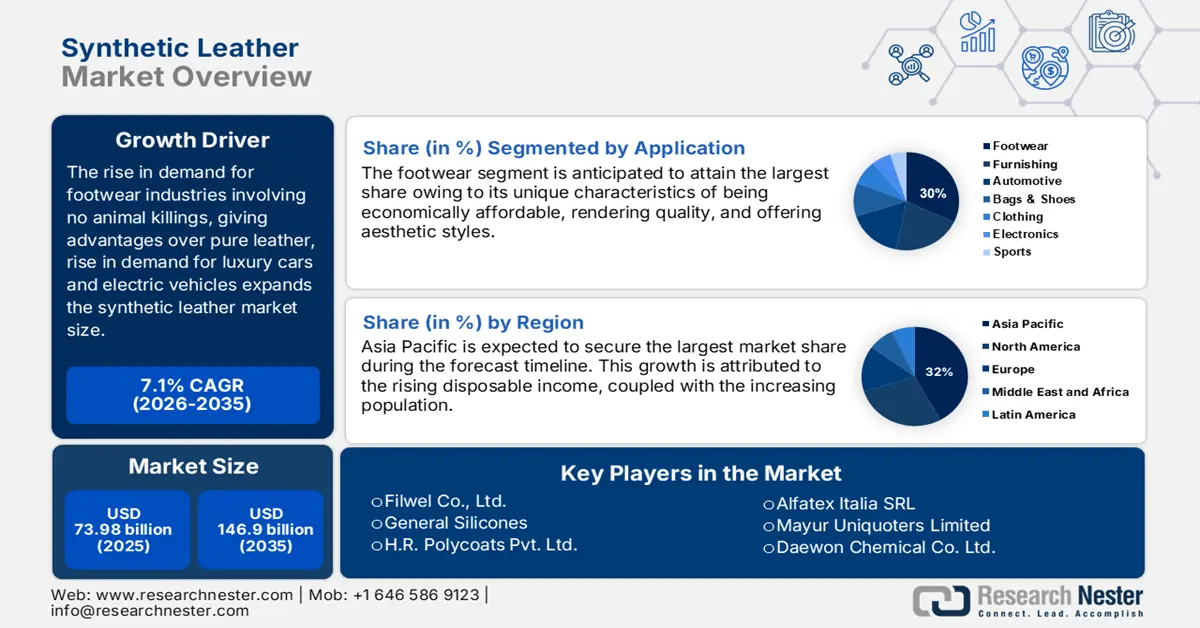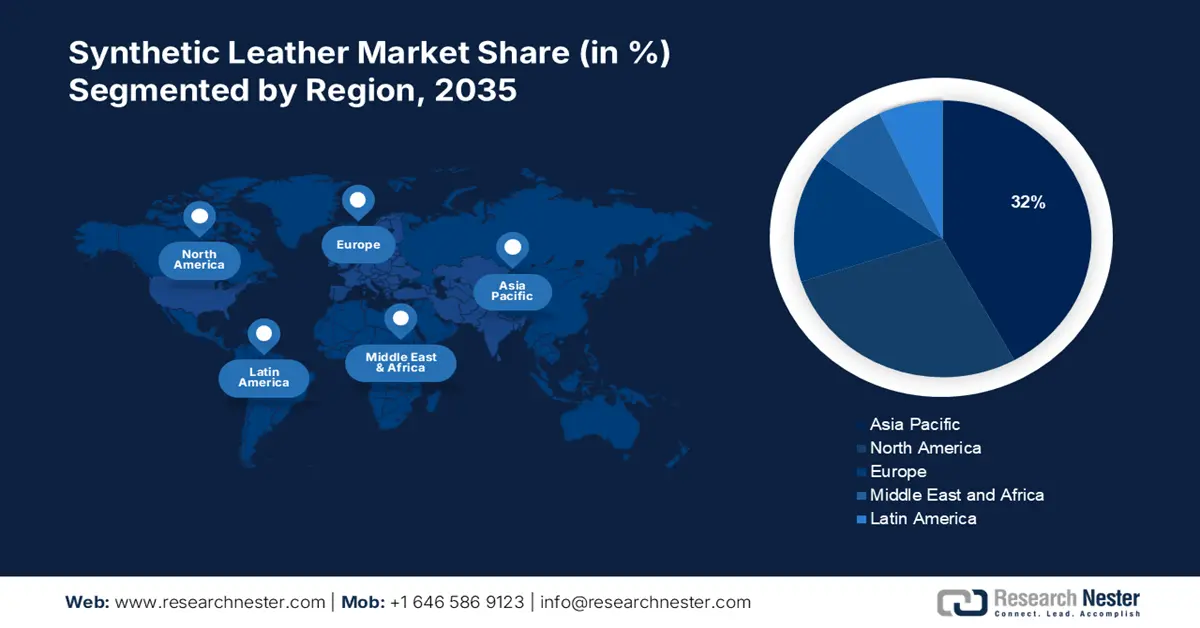Synthetic Leather Market Outlook:
Synthetic Leather Market size was over USD 73.98 billion in 2025 and is projected to reach USD 146.9 billion by 2035, witnessing around 7.1% CAGR during the forecast period i.e., between 2026-2035. In the year 2026, the industry size of synthetic leather is evaluated at USD 78.71 billion.

With the rise in popularity of electric vehicles in recent years, the automobile sector has experienced rapid expansion in recent years.
Some of the key trends affecting the automobile industry are the decrease of harmful emissions to protect the environment, the improvement of safety and comfort, and the combination of more affordable and fuel-efficient vehicles. In 2022, 57 million passenger vehicles were made globally.
In addition, synthetic leather's ability to regulate temperature well, provide exceptional comfort, and be easily styled has led to its growing popularity in the fashion industry. In addition, top fashion labels' investments in the creation of artificial leather clothing and shoes, along with rising consumer demand, will accelerate industry expansion in the years to come.
The negative environmental implications of producing natural leather are increasingly known to consumers because of several online and social media efforts. As a result, customers are becoming more inclined to select natural leather substitutes to contribute to environmental protection.
Key Synthetic Leather Market Insights Summary:
Regional Highlights:
- Asia Pacific synthetic leather market will secure over 32% share, driven by urbanization and rising consumer spending in synthetic leather, forecast period 2026–2035.
- North America market will account for 27% share, fueled by the rise in electric mobility and supportive regulations, forecast period 2026–2035.
Segment Insights:
- The footwear segment in the synthetic leather market is projected to hold a 30% share by 2035, fueled by the affordability and durability of synthetic leather in shoes.
- The pu segment in the synthetic leather market is expected to hold a 28% share by 2035, influenced by the versatility and environmental benefits of PU-based synthetic leather.
Key Growth Trends:
- Increasing demand from the footwear sector
- Concentrate on creating synthetic leather-based on biomaterials
Major Challenges:
- Increasing demand from the footwear sector
- Concentrate on creating synthetic leather-based on biomaterials
Key Players: H.R. Polycoats Pvt. Ltd., Alfatex Italia SRL, General Silicones, tSan Fang Chemical Industry Co., Ltd, Filwel Co., Ltd., Yantai Wanhua Synthetic Leather Group Co., Ltd., Mayur Uniquoters Limited, Daewon Chemical Co Ltd, Nan Ya Plastics Corporation.
Global Synthetic Leather Market Forecast and Regional Outlook:
Market Size & Growth Projections:
- 2025 Market Size: USD 73.98 billion
- 2026 Market Size: USD 78.71 billion
- Projected Market Size: USD 146.9 billion by 2035
- Growth Forecasts: 7.1% CAGR (2026-2035)
Key Regional Dynamics:
- Largest Region: Asia Pacific (32% Share by 2035)
- Fastest Growing Region: Asia Pacific
- Dominating Countries: China, United States, Japan, Germany, Italy
- Emerging Countries: China, India, Japan, South Korea, Thailand
Last updated on : 16 September, 2025
Synthetic Leather Market Growth Drivers and Challenges:
Growth Drivers
- Increasing demand from the footwear sector - With prospects for expansion, the footwear industry is currently the main user of synthetic leather.
The strong demand for modern, fashionable footwear brands and the increase in urbanization are the main factors driving this market expansion. As per our survey, the total spending on clothing, and footwear by the consumer is estimated to reach more than USD 2.5 trillion in the year 2029. - Concentrate on creating synthetic leather-based on biomaterials - The emergence of synthetic leather derived from biotechnology presents a sustainable substitute that lacks any detrimental characteristics.
Commercializing synthetic leather made from natural fibers like cotton, flax, and blends with plants like corn, soybean, and palm should be a top priority for manufacturers. Growing political and environmental restrictions against harmful chemicals in North America and the European Union make biobased synthetic leather a potentially lucrative market for the sector. - Sales of bio-based synthetic leather impacting the growth of the market as a whole - For the purpose of making shoes and purses, producers are switching from using real leather to bio-based or vegan synthetic leather due to growing demand and stringent international laws intended to prevent animal abuse. Furthermore, research has produced environmentally friendly and vegan leather.
Challenges
- Detrimental effects of PVC and PU on people - Synthetic (PU) and polyvinyl chloride (PVC), two basic ingredients used in the manufacturing of synthetic leather, are extremely hazardous to human health and the environment. The isocyanate PU has the potential to be harmful to the environment, human health, and animal health.
It can cause skin irritation, respiratory difficulties, lung irritation, and asthma attacks, especially among workers at PU manufacturing facilities exposed to its vapors. Conversely, dioxin, phthalates, and vinyl chloride monomer are among the harmful carcinogens found in PVC. Particularly hazardous compounds generated during the burning of PVC and other plastics containing chlorine include dioxin. The synthetic leather business faces significant obstacles due to the hazardous properties of PVC and PU.
- Synthetic is criticized for being non-biodegradable and for having an environmental impact that is high in carbon.
- The presence of alternatives in the market may impede market growth.
Synthetic Leather Market Size and Forecast:
| Report Attribute | Details |
|---|---|
|
Base Year |
2025 |
|
Forecast Period |
2026-2035 |
|
CAGR |
7.1% |
|
Base Year Market Size (2025) |
USD 73.98 billion |
|
Forecast Year Market Size (2035) |
USD 146.9 billion |
|
Regional Scope |
|
Synthetic Leather Market Segmentation:
Application Segment Analysis
In synthetic leather market, footwear segment is poised to account for more than 30% share by the end of 2035 due to a variety of interrelated variables, a combination of artistic, ethical, and economic factors contribute to its dominance.
For shoe manufacturers, synthetic leather is an economical option that combines affordability, style, and quality in a seamless manner. Its innate resilience is crucial because it bears the strains of regular use while maintaining its shape and aesthetic appeal over time. Its prominence in the footwear sector is further reinforced by the fact that synthetic leather may be personalized. Worldwide, 23.9 billion pairs of shoes were made in 2022.
Type Segment Analysis
In synthetic (PU) leather market, PU segment is estimated to account for more than 28% revenue share by the end of 2035. PU-based synthetic leather is the most widely used type in the synthetic leather market, with applications in clothing, footwear, furnishings, automotive, bags, purses & wallets, and other end-use industries.
Its versatility, affordability, durability, and environmental benefits further contribute to its popularity. Synthetic leather based on synthetic (PU) has a long lifespan since it can tolerate wear and tear. Its appeal is further boosted by ethical and environmental concerns, as it supports sustainable and cruelty-free options.
Our in-depth analysis of the global market includes the following segments:
|
Type |
|
|
Application |
|

Vishnu Nair
Head - Global Business DevelopmentCustomize this report to your requirements — connect with our consultant for personalized insights and options.
Synthetic Leather Market Regional Analysis:
APAC Market Insights
By the end of 2035, Asia Pacific region is expected to account for more than 32% synthetic leather market share, due to a confluence of industrial, cultural, and economic factors. Urbanization and rapid economic expansion have changed lifestyles and increased consumer spending, which has increased demand for synthetic leather garments, purses, and shoes. India is a profitable market for the selling of synthetic leather because it is one of the world's biggest producers of shoes.
Growing population and rising per capita income would propel shoe sales, which in turn will increase demand for synthetic leather in the Indian footwear sector. With a budget of USD 390 billion, the Indian government has started "the Indian Footwear, Leather and Accessories Development Programme (IFLADP)". Through this program, the government will create plans for human resource development and offer financial support in places where modernizing industrial units is required.
North American Market Insights
By the end of 2035, North America region in synthetic (PU) leather market is anticipated to account for more than 27% revenue share owing to the rise in electric mobility. Furthermore, it is anticipated that rising government support in the form of advantageous programs and regulations will boost market demand.
The newest technologies, such as ADAS, cater to the growing consumer preference for safety and comfort aspects in cars. Additionally, the USA Artificial Leather market was the fastest-growing in the region and had the biggest market share.

Synthetic Leather Market Players:
- H.R. Polycoats Pvt. Ltd.
- Company Overview
- Business Strategy
- Key Product Offerings
- Financial Performance
- Key Performance Indicators
- Risk Analysis
- Recent Development
- Regional Presence
- SWOT Analysis
- Alfatex Italia SRL
- General Silicones
- tSan Fang Chemical Industry Co., Ltd
- Filwel Co., Ltd.
- Yantai Wanhua Synthetic Leather Group Co., Ltd.
- Mayur Uniquoters Limited
- Daewon Chemical Co Ltd
- Nan Ya Plastics Corporation
Recent Developments
- September 2021: Volvo Motors responded to recent studies revealing the future of sustainable luxury goods by pledging to use materials free of leather in all of their upcoming electric vehicles. The venerable automaker's latest move is motivated by a desire to use premium recycled materials to advance animal welfare and sustainability. Volvo is a global automotive company that is electrifying and becoming carbon neutral across all of its brands and production processes.
- April 2023: The Taiwan-based business General Silicones, well-known for its silicone goods, announced the launch of Compo-SiL (SL series) vegan leather, their newest product. This PETA-approved SL series was created especially to meet the needs of consumer products makers. Manufacturers of consumer goods can now source premium vegan leather sources with factory-applied fabric lining.
- Report ID: 5750
- Published Date: Sep 16, 2025
- Report Format: PDF, PPT
- Explore a preview of key market trends and insights
- Review sample data tables and segment breakdowns
- Experience the quality of our visual data representations
- Evaluate our report structure and research methodology
- Get a glimpse of competitive landscape analysis
- Understand how regional forecasts are presented
- Assess the depth of company profiling and benchmarking
- Preview how actionable insights can support your strategy
Explore real data and analysis
Frequently Asked Questions (FAQ)
Synthetic Leather Market Report Scope
Free Sample includes current and historical market size, growth trends, regional charts & tables, company profiles, segment-wise forecasts, and more.
Connect with our Expert
Copyright @ 2026 Research Nester. All Rights Reserved.




